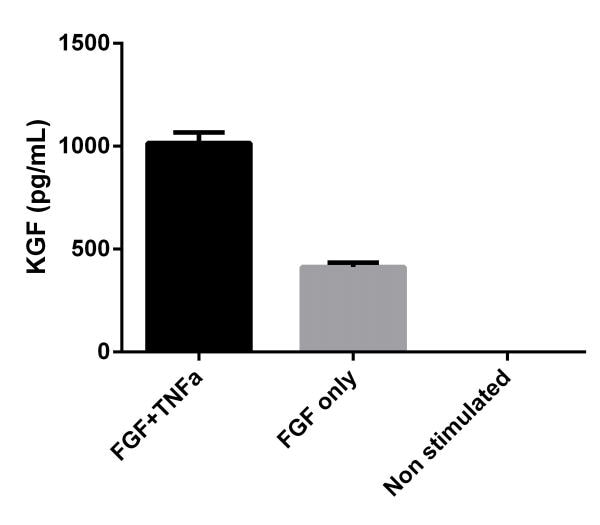Human KGF ELISA Kit (ab183362)
Key features and details
- One-wash 90 minute protocol
- Sensitivity: 7.2 pg/ml
- Range: 31.25 pg/ml - 2000 pg/ml
- Sample type: Cell culture media, Cit plasma, EDTA Plasma, Hep Plasma, Serum
- Detection method: Colorimetric
- Assay type: Sandwich (quantitative)
- Reacts with: Human
Overview
-
Product name
Human KGF ELISA Kit -
Detection method
Colorimetric -
Precision
Intra-assay Sample n Mean SD CV% Cell media 8 3.2% Inter-assay Sample n Mean SD CV% Cell media 3 2.5% -
Sample type
Serum, Cell culture media, Hep Plasma, EDTA Plasma, Cit plasma -
Assay type
Sandwich (quantitative) -
Sensitivity
7.2 pg/ml -
Range
31.25 pg/ml - 2000 pg/ml -
Recovery
103.54 %
Sample specific recovery Sample type Average % Range Serum 103.5 93.5% - 109.8% Cell culture media 114.5 105% - 117.3% Hep Plasma 108.4 105.2% - 115.2% EDTA Plasma 104.6 86.1% - 109.6% Cit plasma 110.6 94.5% - 114.5% -
Assay time
1h 30m -
Assay duration
One step assay -
Species reactivity
Reacts with: Human -
Product overview
Human KGF (FGF7) ELISA kit (ab183362) is a single-wash 90 min sandwich ELISA designed for the quantitative measurement of KGF protein in serum, plasma and cell culture supernatants. It uses our proprietary SimpleStep ELISA® technology. Quantitate human KGF with 7.2 pg/mL sensitivity.
SimpleStep ELISA® technology employs capture antibodies conjugated to an affinity tag that is recognized by the monoclonal antibody used to coat our SimpleStep ELISA® plates. This approach to sandwich ELISA allows the formation of the antibody-analyte sandwich complex in a single step, significantly reducing assay time. See the SimpleStep ELISA® protocol summary in the image section for further details. Our SimpleStep ELISA® technology provides several benefits:
-Single-wash protocol reduces assay time to 90 minutes or less
-High sensitivity, specificity and reproducibility from superior antibodies
-Fully validated in biological samples
-96-wells plate breakable into 12 x 8 wells strips
A 384-well SimpleStep ELISA® microplate (ab203359) is available to use as an alternative to the 96-well microplate provided with SimpeStep ELISA® kits. -
Notes
Human Keratinocyte Growth Factor (KGF) is a 28 kDa glycoprotein and the seventh discovered member of the FGF family (FGF-7). It is primarily secreted by cells of mesenchymal origin and it acts in a paracrine fashion on cells expressing the tyrosine kinase receptor FGFR2b. Binding to the receptor occurs in the presence of heparin sulphate glycosaminoglycans leading to the formation of KGF-FGFR2b-HS dimmers which allow trans-phosphorylation of specific cytoplasmic kinases.
Signaling through FGFR2b has a dual effect, whereby it phosphorylates proteins that promote growth stimulation (FRS2-alpha, IRS4, IGF-1, ERK2, SHP2), as well as proteins that attenuate cell growth and promote cell differentiation (Lamina-associated polypeptide 2, SAP102 and DIg family of tumor suppressor proteins). Furthermore, KGF also induces anti-apoptotic pathways through AKT and p21-activated protein kinase 4 (PAK4) and up-regulates multiple genes involved in proliferation, migration, angiogenesis, differentiation, survival, nucleotide biosynthesis, tissue remodeling, cell cycle progression, DNA repair and detoxification of reactive oxygen species. All these molecular processes lead to tissue protection and regeneration.
-
Platform
Microplate
Properties
-
Storage instructions
Store at +4°C. Please refer to protocols. -
Components 1 x 96 tests 10X Human KGF Capture Antibody 1 x 600µl 10X Human KGF Detector Antibody 1 x 600µl 10X Wash Buffer PT (ab206977) 1 x 20ml Antibody Diluent CPI - HAMA Blocker (ab193969) 1 x 6ml Human KGF Lyophilized Recombinant Protein 2 vials Plate Seals 1 unit Sample Diluent 25BS 1 x 20ml Sample Diluent NS (ab193972) 1 x 12ml SimpleStep Pre-Coated 96-Well Microplate (ab206978) 1 unit Stop Solution 1 x 12ml TMB Development Solution 1 x 12ml -
Research areas
-
Relevance
Fibroblast growth factors (FGFs) can stimulate the proliferation of mesenchymal, epithelial and neuroectodermal cells. Members of the family include Acidic FGF (also known as aFGF or FGF 1), basic FGF (bFGF or FGF 2), FGF3 (also known as Int2) and FGF4 (also known as hst or Kaposi FGF). FGF4 was first revealed to be an oncoprotein in Kaposi's sarcoma cells. Other family members include FGF5, FGF6, FGF7 (keratinocyte growth factor, KGF), FGF8 (AIGF), FGF9 (GAF) and FGF10. -
Cellular localization
Secreted -
Alternative names
- FGF 7
- Fibroblast growth factor 7
- HBGF 7
see all -
Database links
- Entrez Gene: 2252 Human
- Omim: 148180 Human
- SwissProt: P21781 Human
- Unigene: 567268 Human
Images
-
SimpleStep ELISA technology allows the formation of the antibody-antigen complex in one single step, reducing assay time to 90 minutes. Add samples or standards and antibody mix to wells all at once, incubate, wash, and add your final substrate. See protocol for a detailed step-by-step guide.
-
Figure 1. Example of KGF standard curve in sample diluent 25BS. The KGF standard curve was prepared as described in Section 10. Background-subtracted data values (mean +/- SD) are graphed.
-
Figure 2. Specificity of KGF signal on stimulated and non stimulated media supernatants. Human Dermal Neonatal Fibroblasts cells were cultured in HGDMEM supplemented with 10% fetal calf serum, 2 mM L-glutamine, 100 U/mL penicillin and 100 µg/mL streptomycin. Cells were cultured for 2 days at 37°C in the presence or absence of 1 µg/mL of FGF-basic with or without 10 ng/mL of TNF-alpha. The concentrations of KGF were measured after loading neat media on the plate and were then interpolated from a KGF calibration curve on sample diluent 25BS. The mean concentration of KGF (FGF-7) was determined to be undetectable in non stimulated media, 413 pg/mL in FGF-basic stimulated media and 1,016 pg/mL in FGF-basic+TNF-alpha stimulated media.






